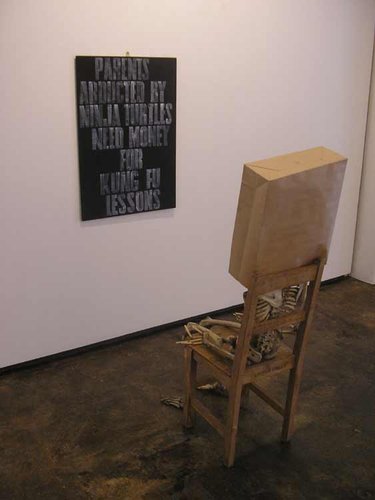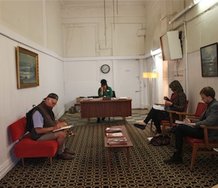Martin Patrick – 7 October, 2010
A much weaker component of the exhibition is the tableau 'Teaching Aid' (2010) which is comprised of a seated skeleton, its skull covered by a paper bag, facing the following painted text: PARENTS ABDUCTED BY TEENAGE NINJA TURTLES NEED MONEY FOR KUNG FU LESSONS. Perhaps these days we are the blind teaching the dead, but this not-so-wild stab at cultural illiteracy ends up being both overly staged and under scripted.
Denys Watkins‘ recent paintings are intriguingly resonant of the current climate: disarmingly austere, characterized by dry humor, and although often alluring the works appear almost notes, shells, masks. Signposts to a degree, they closely resemble in many respects the actual appropriated signs, texts, messages from which they derive their formal language. An emphasis upon satirical sloganeering threads through the body of work, as in the midst of the recession, we read: GET RICH.
Instead of trying to capture a narrative, albeit contradictorily conveyed through a postmodern irony, these images are nearly claustrophobic in their simplicity. Watkins quotes a phrase drawn from the oeuvre of the masterful country and western songwriter Don Gibson: “Sea of Heartbreak,” transcribing said phrase into an atmospheric, grey painted field. The real Gibson made his living conjuring paeans to the side effects of imperiled interpersonal relations. His songs including “Oh Lonesome Me” (and “Sea of Heartbreak”) were once sung by Johnny Cash, who never could keep a resounding joy from leaking out the edges of his voice. Watkins’ painting similarly bespeaks an elegance, restraint and joy, garnered by painting a monochromatic text that nonetheless maintains manifold shades of significatory power.
Watkins’ exhibition brings to mind aspects of Ed Ruscha’s 1980s works, featuring words negatively taped out from their shimmering dark surfaces, and also the ubiquitous handbills, posters, and sticker art which clutter nearby Cuba Street. However quite significantly, Watkins chooses to reinscribe such material back into his own creative microcosm, creating a sort of call and response between the gallery walls and the message laden world outside. He acts to refine “raw” data into his idiosyncratic artworks, transforming floating texts into textured paintings.
According to the artist’s own brief accompanying statement: “These images have been received from different places and sources. Some constructed from possibilities, propaganda, fantasies, and the general dislocation of an over stimulated information bank. Taking the word for a walk.”
A major exception to the smaller scale of most of the works on view is the life-sized Portrait of the World’s Tallest Man, Ba Xishun, herdsman (2010). The figure here becomes a kind of aqueous apparition, a sky blue cipher on a neutral field. Watkins plays a game - one with a long and formidable history - with the figure ground relationship; as Courbet once said of Manet, his figures are “flat as playing cards.” But there’s a simultaneous flattening of affect here as well, recalling again a central postmodern notion - for adjacent to the figure is a painting emblazoned with the motif: “SALE 30% OFF”. This work serves as the focal element around which the rest of the exhibition revolves, a strange and somewhat uneasy constellation, riddled with anomie and malaise.
A much weaker component of the exhibition is the tableau Teaching Aid (2010) which is comprised of a seated skeleton, its skull covered by a paper bag, facing the following painted text: PARENTS ABDUCTED BY TEENAGE NINJA TURTLES NEED MONEY FOR KUNG FU LESSONS. Perhaps these days we are the blind teaching the dead, but this not-so-wild stab at cultural illiteracy ends up being both overly staged and under scripted.
Questions of the social, economic, and political landscape linger as grey noise underneath and within the surface of Watkins’ works. Political events and journalistic commentary morph into cryptic vignettes, the words “INVISIBLE/INVINCIBLE” intersecting on a darkened field. The artist cites a statement by Milton C. Cummings describing the term cultural diplomacy as “The exchange of ideas … with the intention of fostering mutual understanding.” In stark contrast these paintings emit a partial, stuttering discourse built out of fragments.
What are we likely to gain from Watkins’ creative exertions? My take would be that the incisive critical potential of art consistently allows for unexpected renderings and reworkings of readymade material, even though our ubiquitous electronic gadgets remain overtaken by increasingly uniform transmissions of the banal, ethereal, and repetitive.
Martin Patrick






 Advertising in this column
Advertising in this column Two Rooms presents a program of residencies and projects
Two Rooms presents a program of residencies and projects



This Discussion has 0 comments.
Comment
Participate
Register to Participate.
Sign in
Sign in to an existing account.